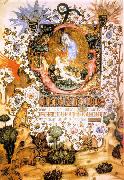Wholesale Oil Painting No Minimum |
|||||||||||
|
|
|||||||||||

|
|||||||||||
|
|
|
||||||||
|
|
||||||||
The Visconti Book of Hours after
The Visconti Book of Hours after Painting ID:: 65149 |
1430 Vellum, 25 x 17,9 cm Biblioteca Nazionale, Florence Giovannino de'Grassi began illuminating this two-volume prayer-book for Gian Galeazzo Visconti; but it was a long time after they both were dead that the work was completed by Luchino Belbello da Pavia and his assistants. The initial of the text, the capital C, is the nucleus of the folio with rather crowded embellishments. Encircled by the letter we can see the creation of Eve, in front of a golden background. The three figures - God the Father, Eve and Adam - are arranged in a way that follows the line of the C. Stylized golden vine-leaves, springing from a straight vine-stock on the right-hand side of the margin, surround the initial, and the seemingly irregular, curving network of vine-tendrils is also adjusted to the shape of the letter. In the arid, rocky landscape at the bottom of the folio there are some luxuriant, thriving bushes and shrubs, with different animals among them, which point back to the previous days of the Creation, when the Earth was populated by plants and animals. The bottom strip with its flat representations - connected with the principal one, as was usual at that time - expands in Belbello's miniature, as it did in the works of his contemporaries, into a spacious stage. In the two upper corners of the initial, groups of radially arranged angels support the Viscontis' unpleasant coat of arms which depicts the serpent devouring a child. We are presented with a fantastic mixture of fairytale and reality, of decoration and representation. The griffin is depicted in a three-dimensional manner as is the hunting leopard, the favourite "domestic animal" of the Viscontis, an animal the painter may have seen every day in his master's park. However, at that time it did not depend only on the presence of the model whether the artist succeeded in representing it successfully. This is shown by the fact that, although there were elephants, bears, lions, monkeys and rabbits too in the Viscontis' menagerie, in Belbello's miniature they appear schematically, in a childishly simplified form. This may be due to the fact that the painter had not had much practice in depicting them and had not mastered the skill of representing them. From among the innumerable instances of the intertwining of natural and fantastic forms it is worth while pointing to the oval, colourful flower cups swaying among the golden vine-leaves. These flowers have nothing to do with reality, and, in particular, not among vine-leaves. On the other hand, they have striking similarities to ornaments on the jewellery of the period, not only because they appear in three-dimensional forms, but because of the enamel-like layers of paint which cover them. Artist: MINIATURIST, Italian , The Visconti Book of Hours , 1401-1450 , Italian , illumination , religious 1430 Vellum, 25 x 17,9 cm Biblioteca Nazionale, Florence Giovannino de'Grassi began illuminating this two-volume prayer-book for Gian Galeazzo Visconti; but it was a long time after they both were dead that the work was completed by Luchino Belbello da Pavia and his assistants. The initial of the text, the capital C, is the nucleus of the folio with rather crowded embellishments. Encircled by the letter we can see the creation of Eve, in front of a golden background. The three figures - God the Father, Eve and Adam - are arranged in a way that follows the line of the C. Stylized golden vine-leaves, springing from a straight vine-stock on the right-hand side of the margin, surround the initial, and the seemingly irregular, curving network of vine-tendrils is also adjusted to the shape of the letter. In the arid, rocky landscape at the bottom of the folio there are some luxuriant, thriving bushes and shrubs, with different animals among them, which point back to the previous days of the Creation, when the Earth was populated by plants and animals. The bottom strip with its flat representations - connected with the principal one, as was usual at that time - expands in Belbello's miniature, as it did in the works of his contemporaries, into a spacious stage. In the two upper corners of the initial, groups of radially arranged angels support the Viscontis' unpleasant coat of arms which depicts the serpent devouring a child. We are presented with a fantastic mixture of fairytale and reality, of decoration and representation. The griffin is depicted in a three-dimensional manner as is the hunting leopard, the favourite "domestic animal" of the Viscontis, an animal the painter may have seen every day in his master's park. However, at that time it did not depend only on the presence of the model whether the artist succeeded in representing it successfully. This is shown by the fact that, although there were elephants, bears, lions, monkeys and rabbits too in the Viscontis' menagerie, in Belbello's miniature they appear schematically, in a childishly simplified form. This may be due to the fact that the painter had not had much practice in depicting them and had not mastered the skill of representing them. From among the innumerable instances of the intertwining of natural and fantastic forms it is worth while pointing to the oval, colourful flower cups swaying among the golden vine-leaves. These flowers have nothing to do with reality, and, in particular, not among vine-leaves. On the other hand, they have striking similarities to ornaments on the jewellery of the period, not only because they appear in three-dimensional forms, but because of the enamel-like layers of paint which cover them. Artist: MINIATURIST, Italian , The Visconti Book of Hours , 1401-1450 , Italian , illumination , religious |
|||||||
|
CONTACT US |

